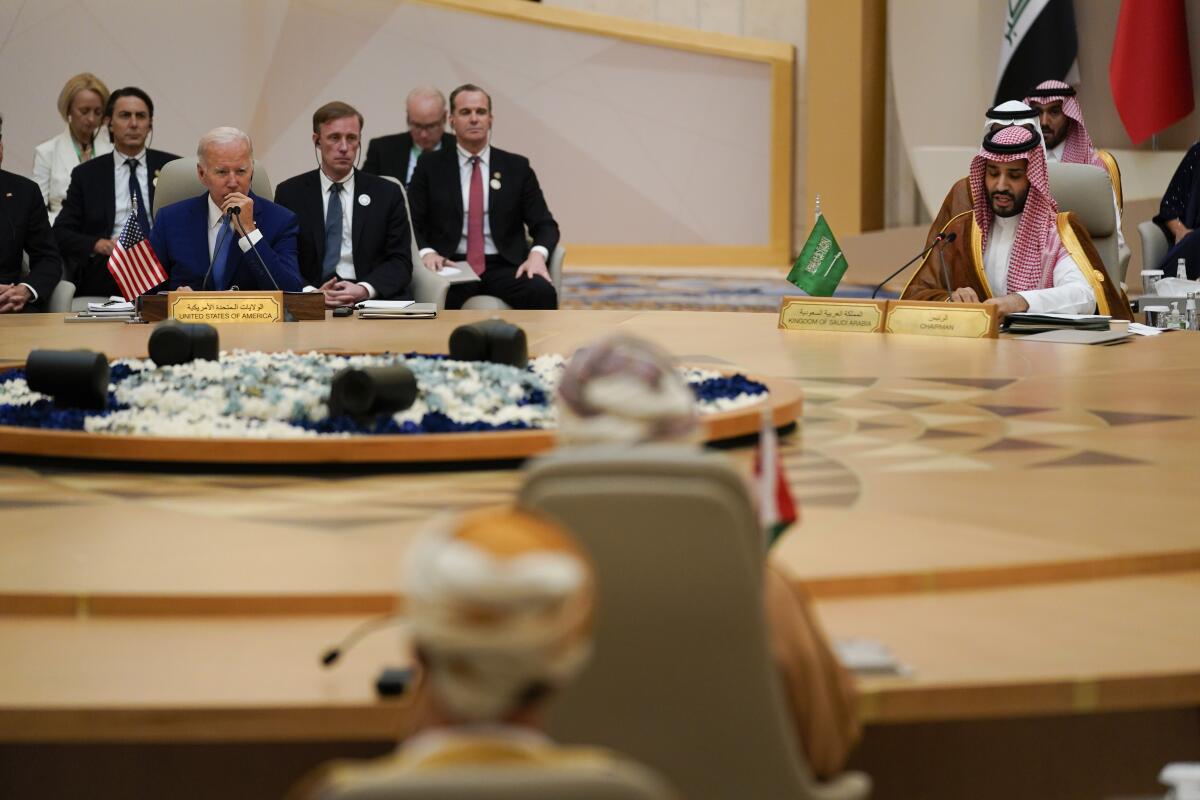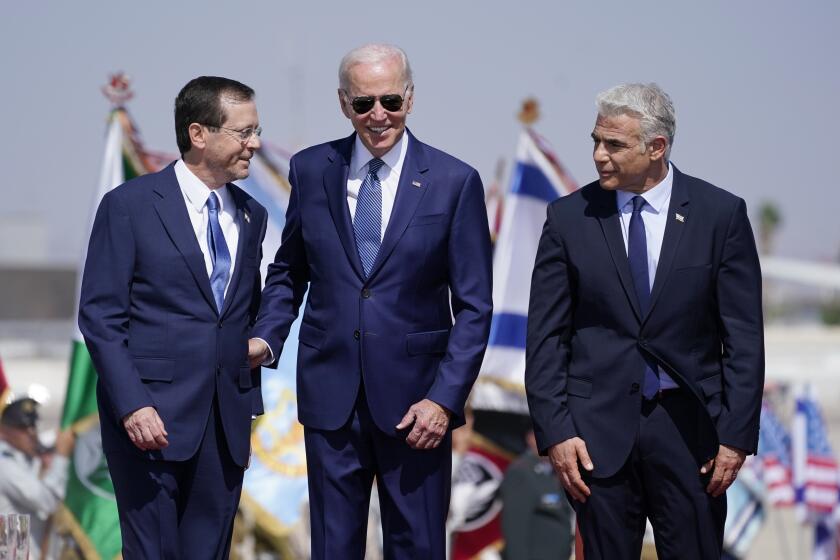Biden vows U.S. will stay in Middle East to limit influence of Russia, Iran

JIDDA, Saudi Arabia — Wrapping up his first Middle East trip since taking office, President Biden vowed Saturday that the U.S. will remain engaged in the region to counter the influence of Russia and China and to combat the threat posed by Iran.
Biden outlined his vision for the Middle East during a meeting in this Red Sea coastal city with leaders from nine Arab countries, a day after he held bilateral talks with the controversial leader of Saudi Arabia.
“The United States is clear eyed about challenges in the Middle East,” Biden said in a speech that capped a four-day trip to the region that included meetings with top Israeli and Palestinian officials. “Let me say clearly that the United States is going to remain an active, engaged partner in the Middle East. ... We will not walk away and leave a vacuum to be filled by China, Russia or Iran [and] will seek to build on this moment with active, principled American leadership.”
Biden, who was scheduled to head back to Washington later Saturday, sat with the leaders of the six Gulf Cooperation Council nations — Saudi Arabia, Kuwait, Bahrain, Qatar, the United Arab Emirates and Oman — along with Egypt, Iraq and Jordan at a large, round table in an ornate hotel ballroom under a crystal chandelier. Reporters were kept at a distance and not allowed to ask questions.
President Biden met with the Saudi royal family in Jidda on Friday, after having said he would marginalize the oil-rich kingdom. He said he confronted Saudi Crown Prince Mohammed bin Salman over the slaying of journalist Jamal Khashoggi.
Throughout Biden’s trip, his first to the Middle East as president, administration officials have sought to link Russia with Iran, hoping to rally more support in the global effort to isolate the Kremlin, which continues to maintain close ties with Middle Eastern countries. None of these nations has joined the U.S. and its European allies in sanctioning Russia for its invasion of Ukraine.
Earlier in the week, national security advisor Jake Sullivan accused Iran of plotting to sell hundreds of weapons-capable drones to Russia. On Saturday he said the administration has evidence that Russian officials visited Iranian airfields to watch demonstrations of the technology.
The White House released images that he said were captured in June showing the delegation.
“What’s happening in the Middle East, I mean, Russia is effectively making a bet on Iran,” an administration official said on Saturday. The official, speaking on condition of anonymity, added, “We are making a bet on a more integrated, more stable, more peaceful, prosperous Middle East region.”
Biden used the trip to highlight the gradual opening of ties between Israel and some Arab nations that until recently had not officially recognized the country. Washington is attempting to build an integrated air defense system that includes Israel and several of the Arab nations as a bulwark against Iran.
Biden also made the case for increased oil production, especially from Saudi Arabia, among the world’s largest petroleum producers. Even if Saudi Arabia adds one or two million barrels a day of crude, however, it’s not likely to have an impact on prices at the pump in the U.S.
The most controversial part of the trip, however, was Biden’s meeting with Saudi Crown Prince Mohammed bin Salman, who is implicated in the 2018 slaying of Jamal Khashoggi, a U.S.-based Saudi journalist. The kingdom has also been sharply criticized by human rights advocates for repressing dissent by women, minorities and activists.
During the 2020 presidential campaign, Biden sharply chastised Saudi leadership and said he hoped to make the country a “pariah” over the slaying of Khashoggi and other human rights abuses. Upon taking office, Biden toned down that criticism. Caught between his rhetoric and the need to reduce oil prices, Biden sought to ease tensions with Saudi Arabia by meeting Mohammed, framing it as part of a broader conference with Arab leaders and as an effort to improve security in the region.
The threat of Iran is bringing former adversaries together, but allies disagree sharply with President Biden over the solution.
Hoping to avoid a photograph of him shaking Mohammed’s hand, Biden gave him a first bump instead ahead of their meetings Friday.

Khashoggi’s fiancee, human rights advocates and the publisher of the Washington Post slammed Biden anyway. “The fist bump between President Biden and Mohammed bin Salman was worse than a handshake — it was shameful,” said Fred Ryan, the publisher of the newspaper, which employed Khashoggi.
Biden said on Friday that Mohammed told him he was not personally responsible for Khashoggi’s slaying. The president claimed he told Mohammed that he thought the prince was.
Khashoggi, a vocal critic of the Saudi royal family, was killed and his body dismembered inside the Saudi Consulate in Istanbul by a Saudi hit squad. U.S. intelligence services concluded that the squad was dispatched by the crown prince.
Biden on Saturday again did not mention Khashoggi in his public remarks, but he did appear to allude to him in the final public meeting with other Arab leaders.
Seated next to Mohammed, Biden devoted a section of his speech to the importance of tolerating dissent as a way to unlock innovation and of building accountable institutions.
“I’ve gotten plenty of criticism over the years,” Biden said. “It’s not fun.”
“No country gets it right all the time, even most of the time, including the United States,” he added. “But our people are our strength. Our countries with the confidence to learn from the mistakes grow stronger.”
Bierman reported from Jidda and Wilkinson from Washington.
More to Read
Get the L.A. Times Politics newsletter
Deeply reported insights into legislation, politics and policy from Sacramento, Washington and beyond. In your inbox three times per week.
You may occasionally receive promotional content from the Los Angeles Times.














